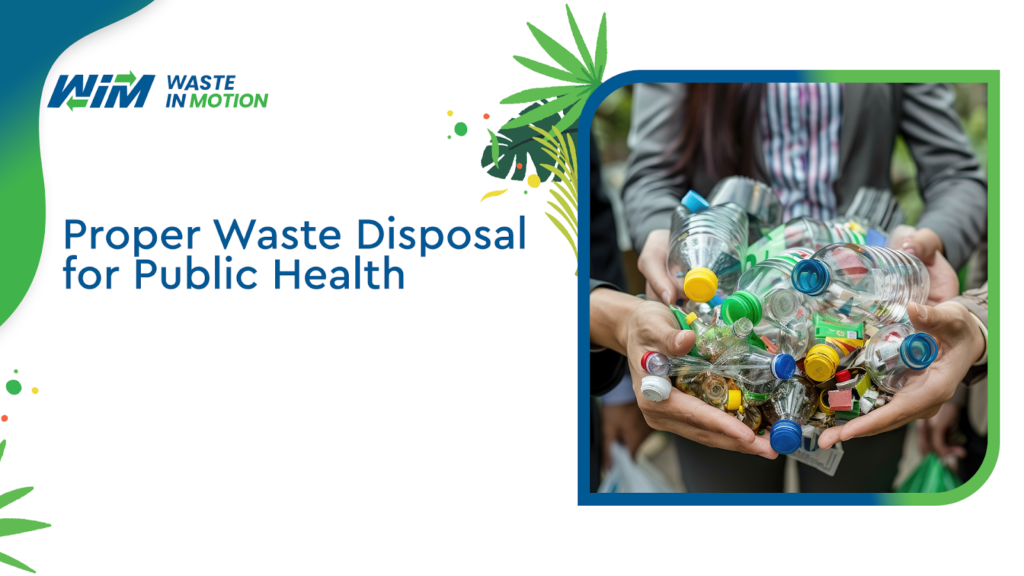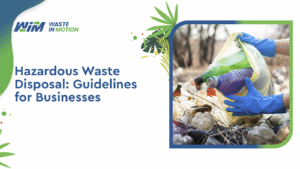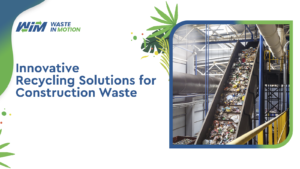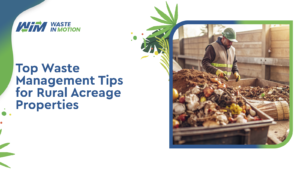Proper waste disposal is an issue that directly impacts public health and environmental sustainability. As waste generation continues to rise globally, effective waste management practices are essential to mitigate health risks and protect communities. This article explores the significance of proper waste disposal, its impact on public health, and best practices.
Table of Contents
ToggleWhat is Waste Disposal?
Waste disposal involves the processes and actions required to manage waste from its inception to its final disposal. This includes collection, transport, treatment, and monitoring of waste materials. Understanding the different types of waste is crucial for implementing effective disposal methods that protect public health.
- Municipal Waste: This includes everyday items discarded by the public, such as household waste, packaging, and food scraps. Municipal waste management is essential for maintaining urban cleanliness and preventing public health issues.
- Hazardous Waste: This category includes waste materials such as toxic chemicals, industrial waste, and batteries. Proper handling and disposal are vital to prevent dangerous exposures.
- Medical Waste: Generated from healthcare facilities, medical waste includes used needles, contaminated bandages, and expired pharmaceuticals. Safe disposal methods are critical to prevent the spread of infections and other health risks.

The Link Between Waste Disposal and Public Health
How Improper Waste Disposal Affects Public Health
Improper waste disposal has severe consequences for public health. Mismanagement of waste can lead to the spread of infectious diseases, contamination of water sources, air pollution, and soil degradation, all of which pose significant health risks.
- Infectious Diseases: Poorly managed waste sites become breeding grounds for vectors such as rats, flies, and mosquitoes, leading to the spread of diseases like dengue, malaria, and leptospirosis. For example, stagnant water in improperly discarded containers can facilitate mosquito breeding, resulting in dengue fever outbreaks.
- Water Contamination: Waste pollutants, particularly hazardous waste, can seep into water sources, leading to waterborne diseases such as cholera and dysentery. Contaminated water can cause acute gastrointestinal illnesses and long-term health effects, especially in vulnerable populations.
- Air Pollution: The burning of waste, especially plastics, releases harmful chemicals into the air, contributing to respiratory problems and chronic conditions such as asthma and lung cancer. Incineration of waste without proper controls also releases greenhouse gasses, exacerbating climate change and its associated health impacts.
- Soil Contamination: Hazardous waste that is not properly contained can leach into the soil, contaminating agricultural lands. This leads to food-borne illnesses and long-term health issues such as neurological damage when people consume contaminated produce.
Common Health Risks Associated with Improper Waste Disposal
Infectious Diseases
The improper disposal of waste is directly linked to the spread of infectious diseases. Waste sites that are not properly managed become hotspots for disease vectors. For instance, the accumulation of organic waste can attract flies, which are known carriers of diseases like typhoid fever. Similarly, improper disposal of medical waste can expose the public to infections such as hepatitis and HIV, particularly in areas where waste picking is common.
Water Contamination
Contaminated water is one of the most significant health risks associated with improper waste disposal. Leachates from landfills and hazardous waste sites can pollute groundwater and surface water, introducing toxins and pathogens into drinking water supplies. This can lead to a range of waterborne diseases, including cholera, dysentery, and hepatitis A.
Air Pollution
Air pollution from waste disposal, particularly the burning of waste, poses serious health risks. The incineration of materials like plastics releases dioxins, furans, and other toxic substances that can lead to respiratory illnesses and increase the risk of cancer. Chronic exposure to air pollution is linked to cardiovascular diseases and adverse pregnancy outcomes, making it a critical public health issue.
Soil Contamination
Soil contamination from improper waste disposal affects agricultural productivity and food safety. Hazardous chemicals, such as heavy metals and pesticides, can enter the soil and be absorbed by crops. When consumed, these contaminated crops can cause health problems ranging from gastrointestinal issues to more severe conditions like cancer and neurological disorders.
Best Practices for Proper Waste Disposal
Waste Segregation
Effective waste management begins with waste segregation. By separating waste at the source—into categories such as organic, recyclable, hazardous, and medical waste—we can reduce the risk of contamination and improve recycling rates. Proper segregation makes recycling more efficient and ensures hazardous materials are handled appropriately, minimizing the impact on public health.
Safe Disposal Methods
Safe disposal of hazardous and medical waste is crucial to preventing environmental contamination and protecting public health. For hazardous waste, methods such as chemical neutralization, encapsulation, and controlled incineration are recommended to prevent the release of toxic substances. Medical waste should be treated with methods like autoclaving, which sterilizes infectious materials before disposal. Utilizing systems such as Moloks can help manage waste more safely and efficiently.
Recycling and Composting
Recycling and composting help in reducing the volume of waste that ends up in landfills and incinerators, thereby mitigating health risks. Recycling involves reprocessing materials like paper, plastic, and metal, reducing the need for new raw materials and minimizing environmental pollution. Composting organic waste, such as food scraps and yard waste, reduces landfill use and produces valuable soil amendments, enhancing agricultural productivity. You can always get a professional recycling service for it.
Regular Monitoring and Compliance
Regular monitoring and strict compliance with waste management regulations are essential to ensuring that waste disposal practices are safe and effective. Conducting regular inspections of waste disposal sites, enforce adherence to waste management regulations, and take corrective actions when necessary. Monitoring air and water quality around waste sites and ensuring compliance with regulations help to protect public health and prevent environmental degradation.
The Role of Municipal Authorities in Waste Management
Policy and Regulation
Municipal authorities are responsible for establishing and enforcing waste management policies that protect public health. Regulations governing waste disposal ensure that waste is handled, treated, and disposed of in a manner that minimizes environmental and health risks. Municipalities also oversee waste contracts, which are critical for ensuring that waste management services are delivered effectively.
Community Engagement and Education
Municipal authorities also play a vital role in educating the public about the importance of proper waste disposal. Through community engagement and education initiatives, authorities can raise awareness about the health risks associated with improper waste disposal and encourage responsible practices. This includes public campaigns, workshops, and school programs that teach the community how to segregate waste, recycle, and safely dispose of hazardous materials. These efforts are essential in reducing public health risks and promoting sustainable waste management practices.
The Economic Impact of Improper Waste Disposal on Public Health
Healthcare Costs
Treating diseases caused by contaminated water, air pollution, and exposure to hazardous waste strains healthcare systems, especially in low-income areas. By investing in proper waste management, healthcare costs can be reduced, and public health improved.
Loss of Productivity
When people fall ill due to waste-related health issues, they are often unable to work, leading to a loss of income and reduced economic output. Businesses that fail to comply with waste management regulations may also face fines, legal actions, and reputational damage, further exacerbating economic losses.
Conclusion
Proper waste disposal is essential for protecting public health and the environment. The risks associated with improper waste management, including infectious diseases, water and air contamination, and soil degradation, underscore the need for effective waste disposal practices. Practices such as waste segregation, safe disposal methods, and recycling, and ensuring regular monitoring and compliance, help to mitigate these risks and promote a healthier, more sustainable future.
By working together with a waste management company to implement proper waste disposal strategies, we can reduce health risks, lower healthcare costs, and protect our communities. Let’s commit to making proper waste disposal a priority for the well-being of current and future generations.








